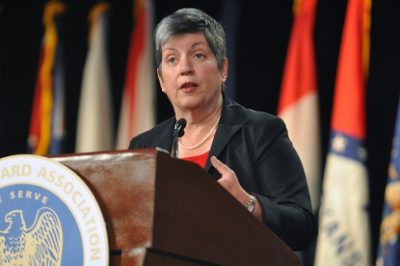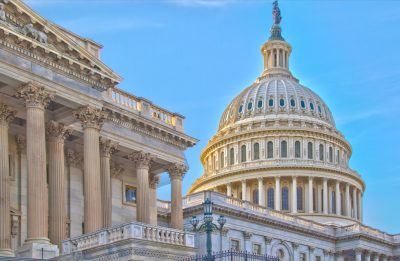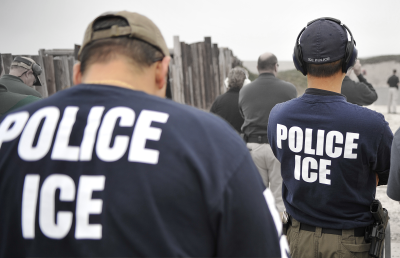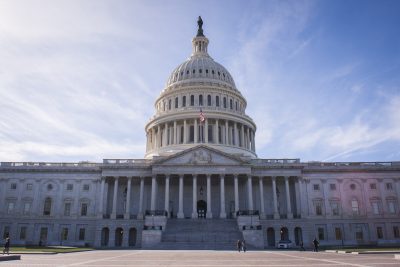Border Enforcement
Migration at the border is a multifaceted issue, challenging the U.S. to secure our borders while upholding the human rights of individuals seeking safety and better opportunities. Balancing national security with compassion and our legal obligations to asylum seekers presents intricate dilemmas, and we collaborate with policymakers to advance bipartisan, action-oriented solutions.
Beyond A Border Solution
- Asylum
- May 2, 2023
America needs durable solutions. These concrete measures can bring orderliness to our border and modernize our overwhelmed asylum system. Read…
Read More
CIS Proposes Unique Approach to Union Organizing
What’s the best way to help workers form a union in a workplace where managers have spent years wantonly violating labor laws by threatening and intimidating workers into resisting unionization? If you’re the Center for Immigration Studies (CIS), the answer would seem to be “get rid of the workers.” At least, that is one of the main recommendations contained within a rather confusing new CIS report on the aftermath of the January 2007 immigration raids conducted by Immigration and Customs Enforcement (ICE) agents at the Smithfield pork plant in Tar Heel, North Carolina. Holding up Smithfield as a prototype for the nation, the CIS report vaguely suggests that destructive immigration raids and a flawed electronic employment-verification system will not only succeed in draining millions of unauthorized immigrants from the United States, but bolster unionization for American workers, too. These are fanciful notions at best. Read More

Policy or Politics? DHS Changes and Expands 287(g) Program
Last Friday, Department of Homeland Security (DHS) Secretary Janet Napolitano announced changes to the controversial 287(g) program—a program which allows state and local police agencies to partner with ICE to enforce federal immigration laws. DHS also announced that, rather than waiting for the new policies to be implemented and tested, it has expanded the problematic 287(g) program with 11 new Memoranda of Agreement (MOAs). The 287(g) program has been broadly criticized by immigrant and civil rights advocates, religious leaders, elected officials and the police themselves. Numerous reports from think tanks, academics, community organizations and police associations have shown that the 287(g) program costs valuable resources, results in mistakes and racial profiling, does not effectively control illegal immigration, and makes it more difficult for the police to serve and protect their communities. Even the government found fault with how the program was being implemented. A March 2009 report by the Government Accountability Office (GAO) found the 287(g) program did not have clear goals and objectives and lacked consistent supervision. Read More

Large Immigrant Populations Keep Cities Safe, Just Ask El Paso, TX
El Paso, Texas, is a relatively poor, Hispanic, gun-friendly city and home to many undocumented immigrants. Yet although El Paso is adjacent to a violence-riddled Mexican city, it’s actually counted among the safest big cities in the U.S. Why is El Paso so safe? A recent article in Reason Online dispels some of the myths associated with immigrants and crime. Many Americans believe that immigrants—especially illegal immigrants—are associated with high levels of crime. However, according to criminologist Jack Levin, El Paso is safe because of its immigrant population. Read More

Council on Foreign Relations Urges Congress to “Get Our Immigration Policy Right”
Today, the Council on Foreign Relations, one of the oldest and most respected non-partisan foreign policy think tanks in America, issued a sweeping report on U.S. immigration policy. Developed by an independent task force comprised of bi-partisan leaders, including former Florida Governor Jeb Bush and Former Clinton White House Chief of Staff Thomas "Mack" McLarty, the report finds that the passage of comprehensive immigration reform is vital to the national interests of the United States. Read More

Community Backlash Over Utah’s Flawed Immigration Law
Utah’s “get tough on immigration” legislation, Senate Bill 81 (SB81), went into effect last week on July 1st. The litany of protests from faith groups, local police, and conservatives, however, demonstrates the futility of trying to solve a federal immigration problem through state law. Even Utah Gov. Jon Huntsman Jr. hesitated before signing SB81 into law back in March 2008, hoping the federal government would intervene with a national immigration reform bill before the July 1st implementation date. Read More

Major City Police Chiefs Just Say No To Immigration Enforcement
Tired of spending scant time and resources on immigration enforcement, major city police chiefs called on Congress, Wednesday, to move on comprehensive immigration reform. Like most law enforcement officers across the country, chasing down undocumented immigrants proves to be too much of a strain when faced with real priorities… Read More

PASS ID Act Not An Immigration Solution
Introduced by Sen. Akaka (D-HI) last week with 5 co-sponsors, the “Providing for Additional Security in States’ Identification Act” (PASS ID) (S. 1261) would give states a breather from the costs and restrictions imposed by the REAL ID Act, which became law in 2005 without Congressional hearings and as part of must-pass war funding bill. The PASS ID Act, however, would do little for immigrant access to licenses and nothing for a common sense approach to immigration reform. PASS ID would repeal the REAL ID Act, which numerous states have vociferously opposed as a burdensome, unfunded mandate and akin to creation of a national ID system. Currently, 23 states have passed laws and resolutions opposing the REAL ID Act, including Arizona whose former governor, Janet Napolitano, is now the Secretary of the Department of Homeland Security (DHS). But PASS ID—like REAL ID—sets national standards for driver’s licenses. Driver’s licenses won’t be accepted for federal purposes if they don’t meet the national standards. Read More

Obama Administration Begins Rolling Back Midnight Regulations Left by Bush Administration
While a bill that would reform our immigration system waits in queue behind other issues, like healthcare and climate change, the new Administration has begun a good faith effort to right some of the most egregious wrongs left by the former White House. For example, last week Secretary Napolitano suspended the Bush administration’s policy of deporting widows of fallen U.S. soldiers. The Wall Street Journal reported: Only a few hundred people were at risk of deportation under the policy, but critics viewed it as one of the most painful consequences of President George W. Bush's immigration crackdown. Under the current interpretation of federal law, some immigrants whose American spouses had died faced possible deportation because their legal status was in limbo. The clause, known as the "widow penalty," had resulted in a spate of lawsuits. Read More

Administration Begins Rolling Back Midnight Regulations Left by Bush Administration
Photo by lombardi. While a bill that would reform our immigration system waits in queue behind other issues, like healthcare and climate change, the new Administration has begun a good faith effort to right some of the most egregious wrongs left by the former White House. For example, last week Secretary Napolitano suspended the Bush administration’s policy of deporting widows of fallen U.S. soldiers. The Wall Street Journal reported: Only a few hundred people were at risk of deportation under the policy, but critics viewed it as one of the most painful consequences of President George W. Bush's immigration crackdown. Under the current interpretation of federal law, some immigrants whose American spouses had died faced possible deportation because their legal status was in limbo. The clause, known as the "widow penalty," had resulted in a spate of lawsuits. Read More

Keeping Migrants Here: Recent Research Shows Unintended Consequences of U.S. Border Enforcement
The Department of Homeland Security released a report this week showing that apprehensions of undocumented immigrants at the U.S.-Mexico border are at their lowest level since 1973, leaving many observers contemplating the factors responsible for this decline. Is it the recession-plagued U.S. economy or beefed-up enforcement efforts? New data from a research team led by Wayne Cornelius, Director of the Center for Comparative Immigration Studies at the University of California, San Diego, sheds light on the decline in apprehensions and reveals the surprising, unintended consequences of border enforcement. Read More
Make a contribution
Make a direct impact on the lives of immigrants.

